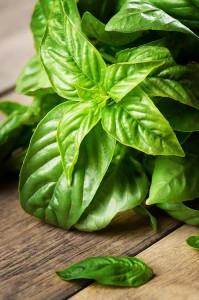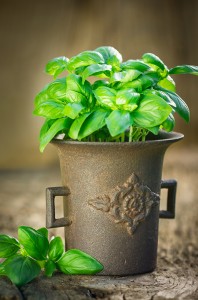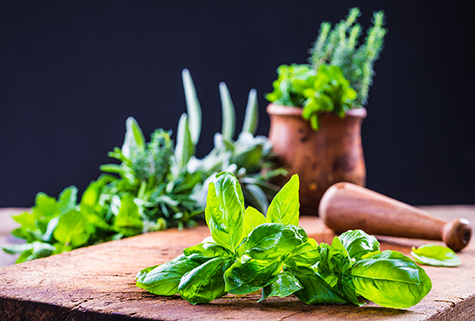The Incredibly Bountiful Benefits of Basil

Basil is a common, fragrant herb that may be growing in your garden or windowsill right now but did you know that it has also been used medicinally since ancient times? Used in Asian, Indian, African and Mediterranean cuisine as a spice to enhance the flavor of savory and sweet dishes alike, basil is commonly used in the U.S. now as well. When discussing the use of basil there are two conversations: the culinary uses and the medicinal benefits. Read on to learn more about both including the pros and potential dangers of using basil in cooking and for medicine.
Nutritionally, basil is versatile and delicious. Basil is:
- Packed with vitamins A, C and K
- Loaded with minerals manganese and magnesium
- Supportive of cardiovascular health
- An antioxidant with flavonoids and volatile oils
- Protective of healthy cells — two unique flavonoids unique to basil include orientin and vicenin and have shown up in human research as beneficial for cells
- Used for treating stomach troubles, and kidney conditions
- Good for circulation
- Used to treat snake and insect bites
- An appetite stimulant, diuretic, lactation stimulant, and an astringent for the mouth
 Most of these benefits may stem from the fact that the volatile oils in basil are antibacterial. In a lab setting, the oils from basil have been shown to inhibit dangerous bacteria like staphylococcous and enterococcus. The volatile oils may also be anti-inflammatory.
Most of these benefits may stem from the fact that the volatile oils in basil are antibacterial. In a lab setting, the oils from basil have been shown to inhibit dangerous bacteria like staphylococcous and enterococcus. The volatile oils may also be anti-inflammatory.
Use fresh or dried basil in a variety of culinary ways. Get creative by adding it to pesto sauce, or placing the fragrant leaves on a sandwich. Add it to salad dressings for a punch of flavor while cutting back on salt. Basil pairs quite well with sweet flavors so incorporate it into fruit dishes, as a syrup or even into ice cream, sorbet or popsicles. Torn basil leaves are refreshing in beverages including sparkling water and tea for the summer months. Mix it with cucumber, mint, or fresh lime.
 Like most culinary herbs, there are some safety considerations of basil though using it in your kitchen as a common spice has been identified as a very safe (and delicious) practice. Feel free to keep using your basil in sauces, deserts and drinks. Sweet basil (Ocimum basilicum), especially in concentrated forms such as oil, contains a natural constituent called estragole which is used in fragrances and flavorings. There has been some concern and preliminary evidence that this compound may be carcinogenic or damaging to the liver though research is still inconclusive about its danger in humans. Medication interactions aren’t a concern when using basil in the diet, but there are a few considerations if taking for medical purposes in concentrated form. There are moderate interactions between basil oils or extracts with blood thinning or blood pressure lowering drugs or supplements. Always talk to your doctor or pharmacist if you are considering adding a medicinal herb like basil oil or extracts in conjunction with other herbs or medications.
Like most culinary herbs, there are some safety considerations of basil though using it in your kitchen as a common spice has been identified as a very safe (and delicious) practice. Feel free to keep using your basil in sauces, deserts and drinks. Sweet basil (Ocimum basilicum), especially in concentrated forms such as oil, contains a natural constituent called estragole which is used in fragrances and flavorings. There has been some concern and preliminary evidence that this compound may be carcinogenic or damaging to the liver though research is still inconclusive about its danger in humans. Medication interactions aren’t a concern when using basil in the diet, but there are a few considerations if taking for medical purposes in concentrated form. There are moderate interactions between basil oils or extracts with blood thinning or blood pressure lowering drugs or supplements. Always talk to your doctor or pharmacist if you are considering adding a medicinal herb like basil oil or extracts in conjunction with other herbs or medications.
| Whether you grow basil in your garden, incorporate into sauces, salads, desserts, or beverages this summer, or even use it as an aromatic oil or fragrance, this powerful herb should be enjoyed as it comes into season. Using it in the diet is perfectly safe so how will you utilize basil this summer? |
Resources
Natural Medicines Database. Basil. https://naturalmedicines.therapeuticresearch.com/databases/food,-herbs-supplements/professional.aspx?productid=303 Updated 12/30/15. Accessed 6/19/17.
Worlds Healthiest Foods. Basil. http://www.whfoods.com/genpage.php?tname=foodspice&dbid=85. Accessed 6/18/17
